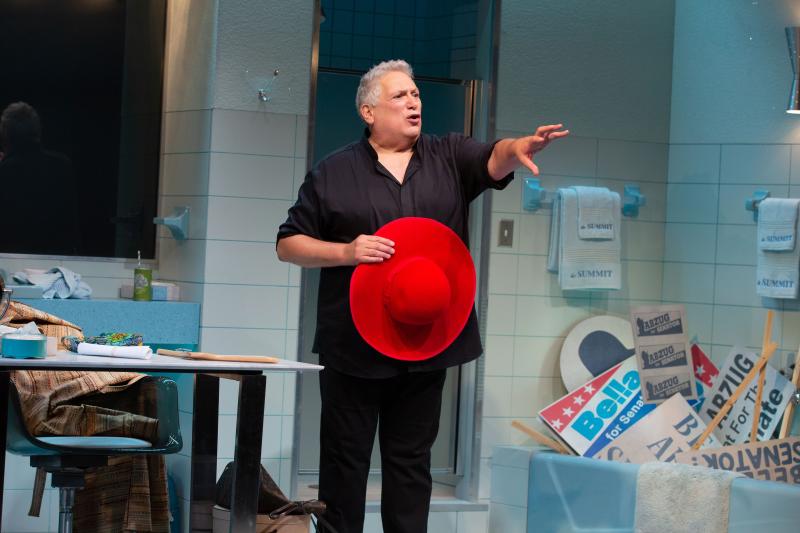Review: Harvey Fierstein Tips His Hat To The Iconic Abzug in BELLA BELLA
"This boy's club crap can't last. One day women will figure this out... And the whole world will change on that day when women take hold of their power."

Yes, to a great many who advocate for American theatre to correct its underrepresentation of plus-sized women in leading roles, it may seem a little, shall we say, peculiar, that these words are spoken by one of theatre's powerful - or at least very popular - men, starring in a solo play about one of New York politics' most recognizable personalities; a woman who might be described as plus-size who paved the way for future women to be a greater part of the decision making process in how government affects their lives.
And while this reviewer agrees that this diversity issue requires rectification, he'll also consider that to Harvey Fierstein's credit, and he deserves a lot of it as playwright/performer of the very enjoyable and informative Bella Bella, there was a serious search for a woman star to headline the play before the creative team, which includes director Kimberly Senior and consultant Liz Abzug, the honoree's daughter, agreed that he'd be a great match for the role.
Indeed, Fierstein is very, very good in a performance that is a tribute, rather than an impersonation. Dressed casually in a black shirt and pants, he offers a brief glimpse of his character modeling her classic wide-brimmed red hat before setting it aside for the rest of his 90-minute monologue.
Born in New York, the only child of Russian Jewish immigrants, the woman affectionately nicknamed Battling Bella achieved initial notoriety as an attorney (though she was rejected by Harvard Law because they didn't accept women) with a passion for labor law and civil rights cases and as a prominent leader in the Women's Rights Movement. By the early 70s she had earned a cherished place on President Nixon's White House enemies list.
Though she won a seat in the United States House of Representatives in 1971, that didn't exempt her from needing her husband's signature to apply for a credit card. Battling Bella helped pass a credit rights law to end that form of discrimination.
BELLA BELLA is set in September of 1976, a couple of hours after midnight, in the large lavatory of Abzug's room at Manhattan's Summit Hotel, rendered with classic 1970s kitsch by designer John Lee Beatty. As supporters like Gloria Steinem, Shirley MacLaine and Lily Tomlin mingle on the other side of the door, Abzug is nervously awaiting the voting results for New York's Democratic primary for the U.S. Senate.
"I've earned this. And they know it," she explains. "But still that son-of-a-bitch boy's club runs five men against me? What are they scared of? My politics or my chromosomes?"

Recalling how someone suggested she should be flattered that it's taking so many men to challenge her, she retorts, "You want to flatter me? Get the fuck out of my way!"
If Abzug's language is a bit salty, it's sweetened by her continual use of Yiddish phrases. The term "momzeh" is reserved for New York Times publisher Punch Sulzberger for his editorial warning, "Moynihan is the only candidate who can stop this radical woman from getting the nomination and eventually losing to Buckley."
As is typical for such ventures, the play, based on Abzug's speeches, books and various quotes, is a collection of memories adding up to a theatrical portrait. There are fond recollections of her father, who, "in an act of protest against the imperialist powers of World War I," named his Hell's Kitchen butcher shop The Live And Let Live Meat Market.
Sadder memories spring from her effort to overturn the death sentence of Willie McGee, a black man sentenced to the electric chair after being found guilty of raping a white woman by an all-white Mississippi jury that took just two and a half minutes to deliberate.
But it's her opinions that highlight the script, and Bella Abzug had plenty of them. Her assessment of past American presidents may certainly remind 2019 audiences of a more recent administration, especially when she criticizes FDR for refusing to open the borders for Jewish refugees and marvels at how Truman demanded loyalty oaths from those who worked for him.
When offered a survey that asked, "Would you vote for a woman if she was qualified?", she responded with, "Now why the hell does a woman have to be qualified when a man only has to be a man?"
By not calling attention to himself by attempting to replicate his subject's distinctive voice and manner, Fierstein allows audience members to envision Bella Abzug themselves.
And perhaps the actor does a share a connection with the firebrand politico that make his performance convincing, especially in a moment where, when facing defeat, she knows full well, "If I give in to my feelings and cry, they'd say it was because I am a girl."


